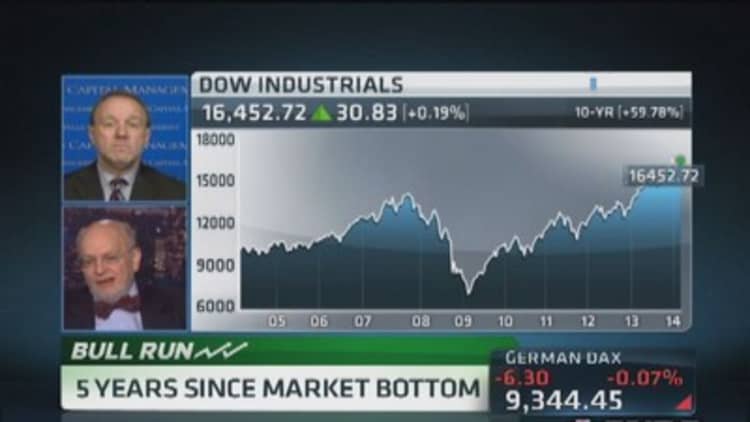Europe's bull market hasn't bellowed quite as loudly in the past five years as the U.S.'s – but it has still had an impressive run.
The S&P 500 has been in a bull market for five years now, and historically bull markets last for five to six years at most. On March 9, 2009, the index closed at a positively satanic 666, five years on it had nearly tripled to 1874.

(Read more: Bull market may still have some sizzle)
The FTSEurofirst300, an index which ranks the 300 largest companies in Europe by market capitalization, has almost doubled over the same period, closing at 1326.7 at the end of last week. This happened despite the euro zone debt crisis and the bailout of weaker euro zone states like Greece and Ireland threatening the region's stability.
Greek equities are one of only two major asset classes (the other is the U.S. dollar) to fall over the period, and are down 30 percent – but this followed a huge credit crisis which some worried would force the country to leave the euro.
The bull market shows how faith in the will of the European Central Bank and European governments to keep the euro afloat has been restored. Confidence in European equities has returned.
The recent unrest in Ukraine, which some feared could be the kind of black swan event that derails markets, caused a minor dip in European stock markets which has since recovered.
A prolonged military conflict or sanctions may disrupt the region's gas supply from Russia.
(Read more: 4 potential bull market killers)
Persistent slow growth in the region's biggest economies is potentially more damaging.
"Earnings and economic growth have been (and we believe will continue to be) lackluster, and without growth or central bank liquidity, we see no generic reason to be bullish of European equities," Stewart Richardson, chief investment officer at RMG Wealth Management, warned.
(Read more: Why bull market is like sex: Warren Buffett)
There is a risk of excess liquidity causing "excess valuations in a narrow range of assets" – or asset bubbles like the dotcom bubble of the early years of the twenty-first century, according to Bank of America Merrill Lynch strategists. So, roughly, if the flight out of emerging markets continues, then the price of assets like London real estate or peripheral euro zone bonds could reach unrealistic heights.
"There are eerie similarities with the 1998-99 period," the BoAML strategists warned.
There are also concerns over European equities' exposure to emerging markets, which account for around 25 percent of European corporate revenues according to UBS research. Panic over the emerging markets has distilled slightly since last year's major sell-off, but is still in the backdrop of market movements.
- By CNBC's Catherine Boyle. Twitter: @cboylecnbc.


